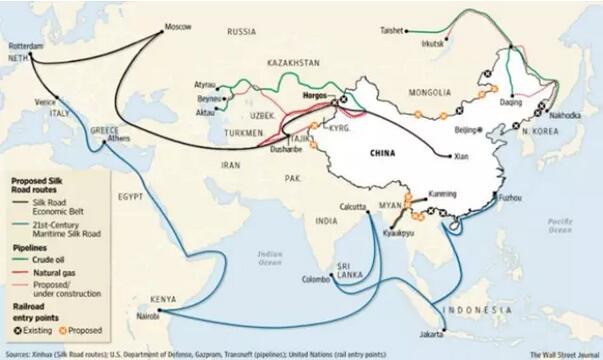中國“一帶一路”政策對周圍鄰國有何影響?
2015-12-01 16:32:03
Landbridge平臺

來源:福布斯
作者:本·辛芬德費爾 | 香港絲綢之路戰略咨詢公司創始人
譯/徐笑音 校/陳岳林
中國“一帶一路”政策對周圍鄰國有何影響?
關于中國的“一帶一路”政策已經有了大量報道,該政策本身其實是引導中國與近鄰開展商業合作、發展政治互信的一個使命宣言。這是眼下發生的真正重要的事。
而該政策的影響差異明顯。過去12個月里,我去過哈薩克斯坦、巴基斯坦和阿聯酋的一些城市,也到過亞洲其他國家,與當地實業家和中國企業主聊過該政策對商業活動有何影響。各人的說法不一,很明顯該政策的影響將因國家不同而存在巨大差異。
哈薩克斯坦的情況展現了該政策的復雜性。作為中國的一個近鄰,以及所謂絲綢之路經濟帶的一部分,哈薩克斯坦應該是第一批感受到該政策影響的國家之一。我的當地接待是一個中國人,他很肯定地說,過去6個月期間,他已經接待了約30個來自中國的省級或市級代表團。
然而,近來在哈薩克斯坦呆過一周之后,我對該政策迄今為止所產生的效果感到失望,即便它可能具有重大的長期影響。
不要期待中國商人會涌上絲綢之路
很多人認為,受該政策影響,中國商人將涌入絲綢之路經過的各個市場,我當然也去過一些處于該經濟帶上的大型中國社區。就拿迪拜來說,據可靠估計,那里的中國人口竟有12萬之多。
但在哈薩克斯坦可不是這樣。我花了幾天時間,參觀了阿拉木圖的幾個商業市場,只發現了幾個中國商人——據他們說這是因為很難弄到工作簽證。事實上,很多人持的是學生簽證,但花在市場里的時間比花在教室里的還要多。
這非常重要,因為突顯出這不是一個“有部署的”發展。如果“一帶一路”產生真正的商業影響,中國公司將發現自己更常與當地合作方共事,而非自帶完整的供應鏈和勞動力。
不是每一個人都對“一帶一路”感到歡欣鼓舞
對于東亞人來說,很容易關注中國的形勢變化,不僅如此,他們還想當然地認為世界其他地方的人也是一樣,尤其在看待“一帶一路”這樣的重大政策時。實際情況是,世界很多地方對中國的這項新戰略從未有所耳聞。
這里又要舉哈薩克斯坦的例子。該國政治領導層非常在意與中國的商業合作。然而,就我的體會來看,很難找到既意識到該政策又明白其對自己國家潛在意義的企業高管。
這不是批評,只是反映了一個事實:總的來說,商界對俄羅斯和歐洲做出的決策更加敏感。也許,隨著低油價迫使哈薩克斯坦尋找新的經濟增長來源,這種狀況將有所改變。但就目前來說,“一帶一路”不是他們首要關注的東西。
但該政策仍將有利于哈薩克斯坦
什么能夠改變哈薩克斯坦對“一帶一路”的認識?中國在該國基礎設施方面的潛在投資。我所對話的高管們通常認為對該國各大城市以外的二級路網進行投資十分重要,更不用說鐵路方面的投資了。
這對中國發起的亞洲基礎設施投資銀行(簡稱亞投行)來說可是一大良機,該銀行正在該地區尋找可投資的項目。對于那些擅長在國內以及全球各新興市場修建公路的中國公司來說,這同樣是一個絕佳的機會。
然而,要提醒的是:哈薩克斯坦只有1,700萬人口,與一個中國大城市的規模相當。機會有限,不夠30個省級或市級代表團個個都吃飽。有些人將失望地空手而歸。
Source: Forbes
Contributor: Ben Simpfendorfer | the founder of Silk Road Associates, a strategic consultancy based in Hong Kong
How China's Silk Road Policy Is Shaping Up In Neighboring Countries
A lot has been written about China’s One Belt One Road policy, but the policy itself is little more than a mission statement to guide the country’s commercial and political engagement with its near neighbors. It’s what happens on the ground that really matters.
It’s also where the differences become apparent. Over the past 12 months, I have visited cities in Kazakhstan, Pakistan, and the UAE, as well as other countries across Asia, speaking with local industrialists and Chinese business owners about how the policy is impacting commercial activity. The stories are mixed and it is clear that the policy’s effects will differ widely by country.
The situation in Kazakhstan demonstrates the policy’s complexities. As a near neighbor of China, and part of the so-called ‘Belt’, the country should be among the first to feel the policy’s impact. My local Chinese fixer certainly claimed he had received some 30 municipal- and provincial-level Chinese delegations to the country during the past six months.
Yet, after recently spending a week in Kazakhstan, I was left feeling underwhelmed by the policy’s impact thus far, even if the long-term changes may yet be significant.
Don’t expect Chinese workers to flood the Silk Road
It’s popular to assume that Chinese traders will flood the Silk Road’s markets as a result of the policy, and I’ve certainly visited some large Chinese communities around the region. Just consider Dubai where the Chinese population is reliably estimated at a huge 120,000.
But this isn’t the case in Kazakhstan. I spent days touring Almaty’s commercial markets and struggled to find more than a handful of Chinese traders–because of their claimed difficulty getting work visas. Many are in fact on student visas but spend more time in the market than the classroom.
That’s important as it underscores that this won’t just be a ‘boots on the ground’ development. If One Belt One Road is to have real commercial implications, Chinese firms will find themselves more often working with local partners rather than bringing their entire supply-chain and workforce with them.
Not everyone is excited about One Belt One Road
For those of us in East Asia, it’s easy to be obsessed by what happens in China. It’s also easy to assume that the rest of the world is, too, especially when looking at a policy change as big as One Belt One Road. The reality is that there are large parts of the world that have never even heard of China’s new strategy.
Kazakhstan is again a case in point. Its political leadership care very much about China’s commercial engagement. Still, in my experience, it is hard to find business executives there who are either aware of the policy or understand its potential implications for the country.
That’s not criticism. It’s simply a reflection of the fact that the business sector is more sensitive to decisions taken in Russia and in Europe, in general. Maybe that will change as low oil prices force the country to look for new sources of economic growth. But for now, OBOR is low priority.
But the policy will still be good for Kazakhstan
What could change perceptions around OBOR? China’s potential investment in the country’s infrastructure. The executives I spoke to most often argued that investment in the country’s secondary road network outside the major cities is critical, not to mention investment in railways.
That’s a perfect opportunity for the Chinese-led Asian Infrastructure Investment Bank (AIIB), as it scours the region for projects to fund. It is also an ideal opportunity for those Chinese companies that have excelled in building roads at home and in emerging markets around the world.
There is a caveat, however. Kazakhstan has a population of just 17 million people, making it the same size as a single large Chinese city. There simply aren’t enough opportunities for each of those 30 municipal- and provincial-level delegations. Some will leave the country disappointed.
版權與免責聲明:此稿件為引述消息報道,稿件版權歸原作者所有,Landbridge平臺不對本稿件內容真實性負責。如發現政治性、事實性、技術性差錯和版權方面的問題及不良信息,請及時與我們聯系,并提供稿件的【糾錯信息】。糾錯熱線:0518-85806682

Landbridge平臺常務理事單位
- [常務理事單位] 沈陽陸橋國際貨運代理有限公司
- [常務理事單位] 湖南中南國際陸港有限公司
- [常務理事單位] 成都厚鯨集裝箱租賃有限公司
- [常務理事單位] 湖南德裕物流有限公司
- [常務理事單位] 安德龍國際物流集團
- [常務理事單位] 重慶逆鋒國際貨運代理有限公司
- [常務理事單位] 陜西遠韜供應鏈管理有限公司
- [常務理事單位] 天津海鐵聯捷集團有限公司
- [常務理事單位] LLC ST GROUP
- [常務理事單位] 宏圖集裝箱服務有限公司
- [常務理事單位] 哈薩克斯坦Falcon
- [常務理事單位] 青島和泰源集裝箱堆場
- [常務理事單位] 俄羅斯戰艦國際貨運代理有限公司
- [常務理事單位] 青島亞華集裝箱堆場
- [常務理事單位] 海晟(上海)供應鏈管理有限公司
- [常務理事單位] 俄羅斯西格瑪有限責任公司





